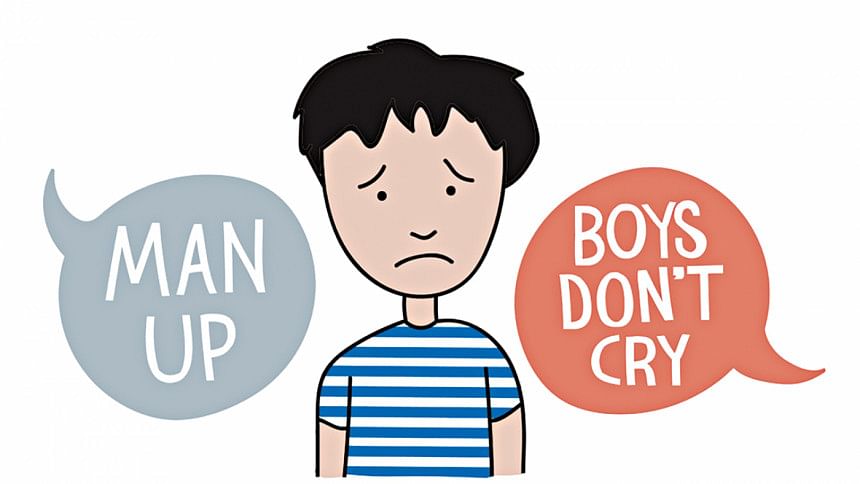GENDER-BASED EXPECTATIONS AND WHY THEY ARE WRONG

In the conservative and patriarchal society of Bangladesh, gender-based labels and roles are strictly defined and imposed on children. Children are not only assigned to certain roles and activities, but they are also rebuked harshly if they show any interest in any other activity that is thought to be suitable for those belonging to the opposite gender. Having gone on for centuries, it has served as a major hotbed where misogyny, inequality and discrimination have blossomed over the centuries. These are just some of the gender-based activities and roles that children in Bangladesh are expected to stick to.
BOYS DON’T CRY
This is prevalent all over the world, boys are not supposed to express their emotions. Boys are expected to suppress everything and be “tough”. This is so deeply ingrained in the mentality of the people of the country that many men are actually afraid of expressing their emotions. How many grown men have cried – or talked about their pain – in front of you in terribly traumatising circumstances? Men are expected to coil everything up at the cost of letting their pain get the better of them. This is glorified in our popular culture as well. I grew up idolising the protagonist of a famous Bangladeshi children’s novel but now that I can detect the wrongs that have been accepted and normalised, I refuse to recommend this book to children – simply because I remember a scene in which the protagonist breaks down after having been bullied and his father tells him, “Chhi, chele manusher kadte nei.” (Boys don’t cry)
WHY IT IS WRONG: Boys are expected to think of expression of emotions as “feminine” and thus refrain from it. But what exactly is wrong with being what they call feminine? When boys are asked to suppress their emotions because that would make them more “masculine,” aren’t they being encouraged to see femininity as something inferior? Isn’t this nurturing the seeds of misogyny?
We human beings were designed to be emotional. If we prevent men from expressing their emotions, it will eventually take its toll on their mental health. It can even go on to make them apathetic and abusive.

I was really shocked and saddened when a friend of mine told me how he had to go to the rooftop, call a friend and break down just because his family members would hate it if he cried in front of them. Why did his family members deny him the emotional support he needed? Just because of some constructed social norms that will only affect his mental health in the long run?
RESTRICTIONS WHEN IT COMES TO GAMES
Boys are expected to play outdoor sports like cricket and football, while girls – in many Bangladeshi families – are asked to stay indoors and stay busy with dolls and haari-patil khela (playing with toy crockery).
WHY IT IS WRONG: Age-old patriarchal traditions dictate that a boy, when he grows up, has to go outside and earn a living, while a woman is expected to stay home and look after children. These traditions are reflected in the games that children are assigned to. How many boys are encouraged to cook? The expectation that these boys will be looked after by women of their families all their lives has been tragically normalised. While these traditions cripple men when it comes to domestic issues like cooking and cleaning, they also hamper the economic rights (among others) of women, as girls – in these cases – are being raised only to be good wives and good mothers, instead of being encouraged to get an education and be financially independent.
ROLES WITHIN THE FAMILY
In many households, girls are expected to be tidy, punctual, docile and well-behaved, while unruliness and misbehaviour from boys are often normalised and accepted. When a boy misbehaves with his parents, he is often allowed to get away with it and a lot of excuses are granted in his favour – that it’s just how boys are, that boys will be boys. In many cases, no steps are taken for their rectification.
WHY IT IS WRONG: This indicates that the patriarchal concepts about gender roles are being conformed to. It indicates that parents just wish to marry their daughters off, teaching them to be well-behaved. According to these ancient norms, boys are expected to focus only on their future careers which is why domestic unruliness is forgiven, while girls are taught to be well-mannered and docile. But shouldn’t everyone, regardless of gender, be taught to behave well and be courteous? Aren’t these traditions strengthening patriarchy and inequality and making men abusive, ill-mannered and short-tempered?
The gender-based expectations that are prevalent in our country only add fuel to a lot of fires, resulting in misogyny, inequality and toxic masculinity. We can never hope for a just and equal society if these continue to be practised.
When he is not dealing with mood swings, Shounak Reza devours books and tea and longs for eras he has never lived in. You can contact him at www.facebook.com/shounakreza

 For all latest news, follow The Daily Star's Google News channel.
For all latest news, follow The Daily Star's Google News channel. 



Comments